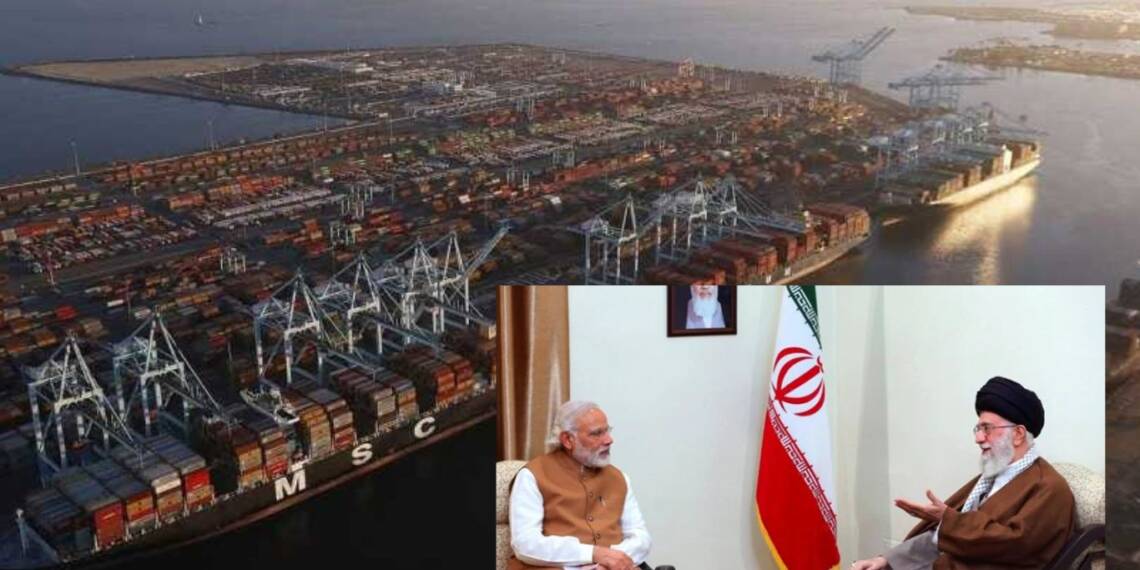India has vowed its support to the development of Chabahar Port in Iran, despite renewed US sanctions aimed at curbing Tehran’s economic activities. The move comes in response to an executive order signed by US President Donald Trump, targeting Iranian financial and trade sectors, including the Chabahar project.
Speaking at an event marking the 46th anniversary of the Islamic Revolution of Iran, Indian Foreign Ministry highlighted the importance of regional connectivity, stressing that the Chabahar Port project symbolizes India and Iran’s “shared vision for mutual benefit.” He stressed that the deepwater port in southeastern Iran is crucial for enhancing trade and economic ties, particularly with Afghanistan, Central Asia, and Russia.
The US administration under President Donald Trump is all set to put its “maximum pressure” policy against Iran. The policy seeks to restrict Tehran’s access to funds generated through oil exports, ports, and related businesses. On February 10, President Trump signed an executive order which directed Secretary of State Marco Rubio and US Treasury Secretary Scott Bessent to modify or cancel sanction waivers, including those that previously exempted Chabahar Port due to its role in facilitating humanitarian assistance to Afghanistan.
“The Secretary of State shall modify or rescind sanctions waivers, particularly those that provide Iran any degree of economic or financial relief, including those related to Iran’s Chabahar port project,” the order stated.
Despite these developments, India has taken a strong stance, reaffirming its commitment to the Chabahar project. India and Iran had in 2015 signed an MoU to facilitate India’s partnership in developing the port. In 2024, the two sides signed a contract, known as the “golden gateway” that will have India equipping and operating the Shahid Beheshti terminal of the port over the next 10 years. The port opens up opportunities for India to trade and commerce with Afghanistan and Central Asia while providing an alternative and reliable access route to Afghanistan, bypassing Pakistan.
Chabahar Port is a vital part of the International North-South Transport Corridor (INSTC), a strategic trade route developed by India, Iran, and Russia. The corridor provides an alternative to the Suez Canal, linking Mumbai with Iran’s Bandar Abbas, Bandar-e-Anzali, and Chabahar before crossing the Caspian Sea to Russia’s Astrakhan. The route then extends to Moscow and St. Petersburg via rail and road networks. Due to adversarial relations with Pakistan, India lacks direct access to the Central Asian region. The port is followed by a railway line throgh Iran provide access of Central Asia to India. Strategically, India can have an eye on the Persian Gulf. Chinese presence at Gwadar port can also be countered by Indian presence at Chabahar, which is just 90 km away from Gwadar.
Also Read: Nuclear boost for Iran? China sends 1000 tonnes of missile fuel to Tehran
The port has proven its logistical and economic potential, facilitating increased maritime activity. An Indian government report noted a 43% rise in vessel traffic and a 34% increase in container movement through the INSTC during the financial year 2023-24. The Iranian ambassador to India, Iraj Elahi, praised the growing economic ties between the two nations. He also highlighted the role of the port in enhancing trade connectivity.
Importance of the Chabahar Port
The Indian government has consistently maintained that the Chabahar Port serves regional stability and development. The port has played a key role in delivering humanitarian assistance, particularly during the COVID-19 pandemic, by ensuring a steady supply chain for essential goods to Afghanistan.
India and Iran initially signed a Memorandum of Understanding (MoU) in 2015 to facilitate India’s participation in the project. The long-term contract in 2024 reaffirmed India’s strategic interest in the port’s development. Indian officials argue that the port’s location in the Arabian Sea insulates it from geopolitical tensions in the Persian Gulf and the Strait of Hormuz, enhancing its reliability as a trade hub.
The renewed US sanctions may pose a few challenges for India’s continued engagement in the Chabahar project. The Trump administration’s directive to nullify sanction waivers could lead to increased financial and operational risks for Indian enterprises involved in the port’s development.
However, India has reiterated that its collaboration with Iran at Chabahar is aimed at fostering regional connectivity and economic cooperation. Indian Foreign Minister Subrahmanyam Jaishankar previously stated that the agreement to operate Chabahar Port is “for everyone’s benefit,” underscoring its importance beyond bilateral trade. India, at this juncture, when it clout has increased in international politics, looks more to secure its own national interest without bowing to any external pressure.
Washington also understands it well.
India is slowly and gradually changing its policy and building deeper relations with the US, especially with the Trump administration. Keeping this background in mind, it looks like India’s engagement in Chabahar port will have to be managed delicately. India looks confident in safeguarding its strategic interests in the region.
For now, India remains committed to the port’s development, signalling its determination to maintain an independent foreign policy that prioritizes economic connectivity and regional trade stability.







